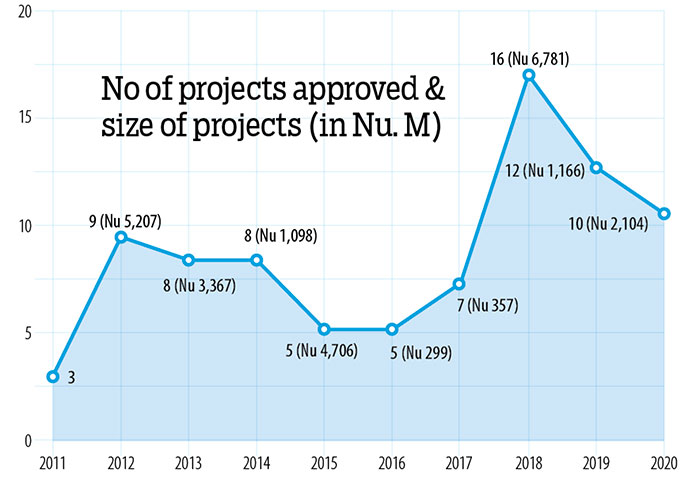MB Subba
The government approved 10 Foreign Direct Investment (FDI) projects amidst the Covid-19 pandemic last year, according to the FDI annual report 2020.
Five of the projects are in the manufacturing sector and the others in the service sector. Ferro Alloys and IT were the most attractive sectors for FDI in 2020.
Although the number of approved projects declined by two from 2019, the value of the projects last year increased by 80 percent to Nu 2.104 billion (B) from Nu 1.166B.

From within Asia, India remains the major source of FDI investments in the country with 47 percent. Five of the 10 projects—three in Ferro Alloys; and one each in hotel and manufacture of bamboo flooring products, furniture and decorative materials—are from India.
Two of the projects are IT-based and their promoters are from the US and Singapore. The FDIs also include an investment in growing edible oil and medicinal mushrooms from Thailand.
The other two FDIs, which are promoted by investors from Germany, are in the construction and microfinance sectors.
With the 10 new projects, the total number of projects today stands at 92.
Issuance of approvals and certificates of FDI registration are two different stages of receiving FDI projects. The government issues a certificate of FDI registration before approving the project.
A total of nine projects were issued FDI registration certificates in 2020, of which three were approved. This means that six of the projects that received FDI registration certificate in 2020 are processing approvals.
Tengye Lyonpo (Economic Affairs Minister) Loknath Sharma said that he was happy to note that the country received FDIs despite the Covid-19 pandemic. He said that the revision of the FDI policy in 2019 had a few positive impacts and that it could help Bhutan attract more FDI in the future.
Lyonpo said that the projects approved in 2020 were at various stages of implementation. “We’re expecting that they’ll be in good shape by the end of this year,” he said.
According to the report, 64 percent of the total approved FDI projects have started commercial operation. About 66 percent of them are located in Thimphu, Paro and Chukha, with most of them (38 percent) being in Thimphu.
About 44 percent of the total FDI projects approved in the manufacturing sector are located in industrial parks.
According to the report, 42 percent of the FDI projects are at the Pasakha industrial park, 25 percent each in Jigmeling and Motanga industrial parks, and 8 percent in Dhamdum industrial park.
The report also highlights the FDI achievements in terms of capital inflows, employment generation and tax benefits.
The country received a total of USD 22.98 million (M) as capital inflows from foreign investors in 2019. Inflows from Indian investors were recorded at INR 766.38M.
The FDI projects that were in operation as of December 2019 employed a total of 4,486 Bhutanese directly as regular employees. In addition, they employed 777 Bhutanese as casual workers, taking the total to 5,263.
The FDI companies employed a total of 183 regular foreign workers, which was only 3.9 percent of total regular employees. This means that for every single expatriate working in the country, there are 25 locals employed.
The FDI companies contributed a total of Nu 1.531B as taxes to the government in 2019. This was a decline of 12 percent from 2018.
The economic affairs ministry carried out a survey of FDI projects for 2019 in 2020. But a few companies were not able to provide data as they were closed during the year due to the pandemic.
“The decline in the tax revenue could partially be explained by a few companies failing to submit the annual survey during the year,” the report states.
A total of 10 FDI projects in the manufacturing sector exported goods worth Nu 3.7B. Of this, goods worth Nu 3.6B were exported to India.

